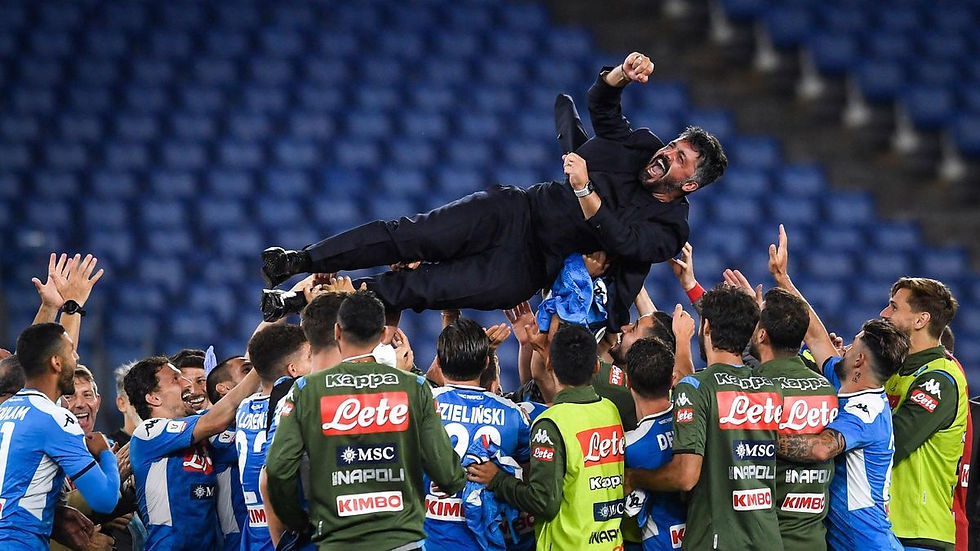Is a player bigger than the club?
- kcottrell2012
- Nov 1, 2020
- 4 min read
One of the phenomena I've experienced since I began following football is the dichotomy in fandom. Well, I'd even maybe have it fall into three or four categories, but we'll stick to two for the purpose of this discussion. On one side, there's "normal" fandom, which is supporting the local team or the one you choose when you start following the sport. The other is being a "Stan" for individual players. In America, this certainly isn't a new thing, and I'm not even mentioning "plastics" or "bandwagoners", but the first huge athlete in a team sport this happened with was in the 1980s and 90s with Michael Jordan. There were, of course, other superstars over the years; Bill Russell, Larry Bird, Magic Johnson, to name a few, but Jordan was the first worldwide one. The number of titles won, and the fact that technology allowed people to watch sports on TV were two big reasons for this shift. Continuing the basketball focus, the next individual was Kobe Bryant, and he was followed by LeBron James. To bring football back into this, the latter two were fully established/coming into prominence when Cristiano Ronaldo and Lionel Messi arrived onto the scene, and they're still at it.

I actually think, for sporting reasons, the Kobe/LeBron and Cristiano/Messi comparisons are somewhat acceptable. By this, I mean you have one associated more with "natural ability", while the other's labelled a "hard worker", one stayed "loyal" to his team throughout his career, while the other moved around. The point of this wasn't to compare these athletes, so I'll get back to the original idea of the article. In essence, following from the Jordan example, you started to see people choosing to be a fan of a player, rather than a team. Personally, I don't like it, and it contradicts the entire point of being a sports fan. My reasoning is you rarely see anyone being a fan of any random player, it's almost always a "world class" player. The ones in the GOAT conversation are the worst, in terms of their fans. Any time their favorite player wins something, they have this artificial sense of accomplishment, as if they were out there on the court. If your country or local team wins a championship, that's one thing, because you actually would have helped support the success, but the best in the world don't need your support to win. That's what they do.
On a related note, there's the "I'm a fan of __ because he's from my country, so now I'm a fan of whatever team he's on." This is just as unnecessary, in all honesty. Again, it's rarely just any athlete from a country, it's someone the country's national team hopes hinge on. Mo Salah is one, seeing as he was just another guy until that Roma stint. He goes to Liverpool and now all these Egyptians claim to be fans. Also, the better a nation is at football, the less often you see nonsense like this. Look, I get that a certain country is happy to have one of their own doing well, but let's be real, this dude doesn't know you. It's like the few people I know that have gone pro. One of them I played basketball with and plays in the NFL now. I don't go around saying hey look at me I'm a Titans fan now because I went to school with so and so for 10 years. Also, the guys I went to UVA with who play in the NBA, I don't go around bragging about that. Working in sport means you don't get to go around fanboying, which is exactly what this phenomenon is.
The other aspect of fandom that sometimes irks me is following a team during a certain period of success. Current rules in football limit the competitiveness, but back in the day this was certainly the case. You'd see teams like Barcelona, Liverpool, Madrid, Milan, United, etc. gain millions of fans due to success, be it a golden generation, manager, or a combination of factors. It's a self-fulfilling prophecy; good teams win trophies because they have good players, thus they continue making more money than the rest, allowing them to buy/keep the best players, and win more, so more fans flock to them. In years that the success isn't there, you see people much less involved with the team, or even "support" another team altogether.
In conclusion, I'll provide one last example of what I deem acceptable fandom and why. There's been, since let's say the early 2000s, a mutual relationship between the US and Fulham. The current owner lives here and owns an NFL team, and various Fulham players through the years have been from the States. Thus, outside the "big six" in the Premier League, Fulham is one of the most popular clubs for Americans (along with Everton, who also had at least 2 Americans at one point). Having one megastar player that you follow wherever he goes is one thing; you don't actually care about the club. Seeing a pathway for people of your nation, like at Fulham or recently with Dortmund and the Red Bull sides, is a totally different thing. Also, picking a club for this reason and remaining an actual supporter of the club is totally different from club-hopping for a top player. The social network numbers when Cristiano or LeBron changes teams back up this entire argument.


Comments